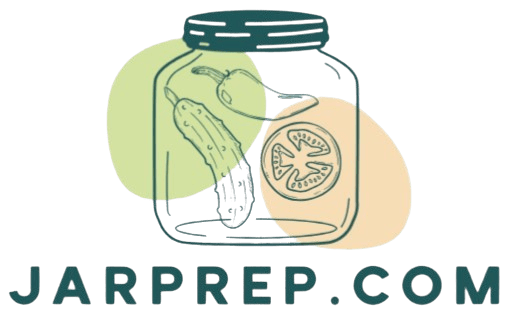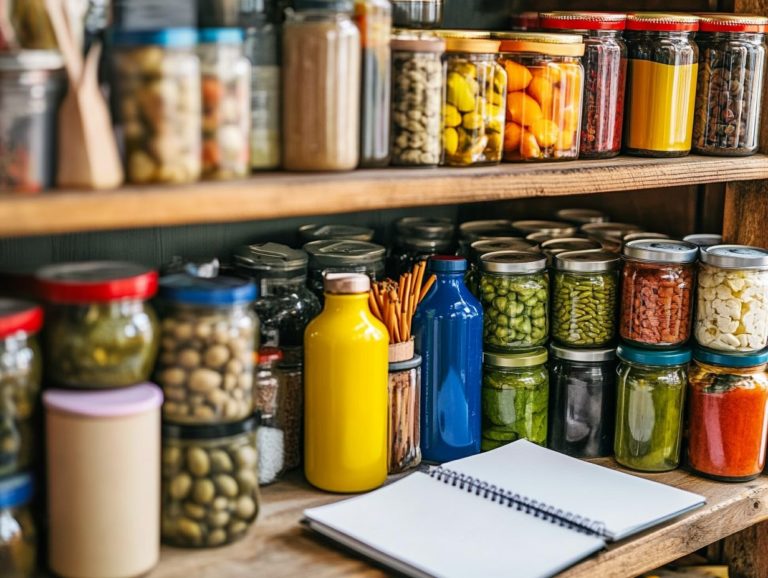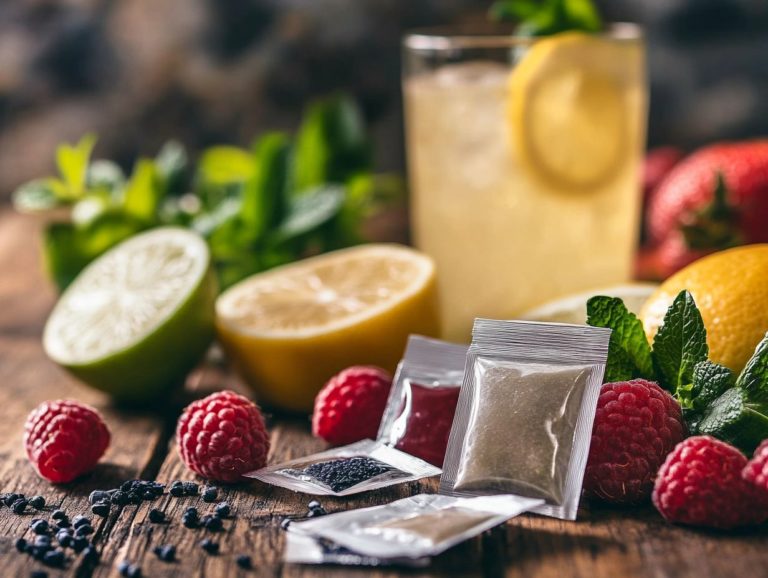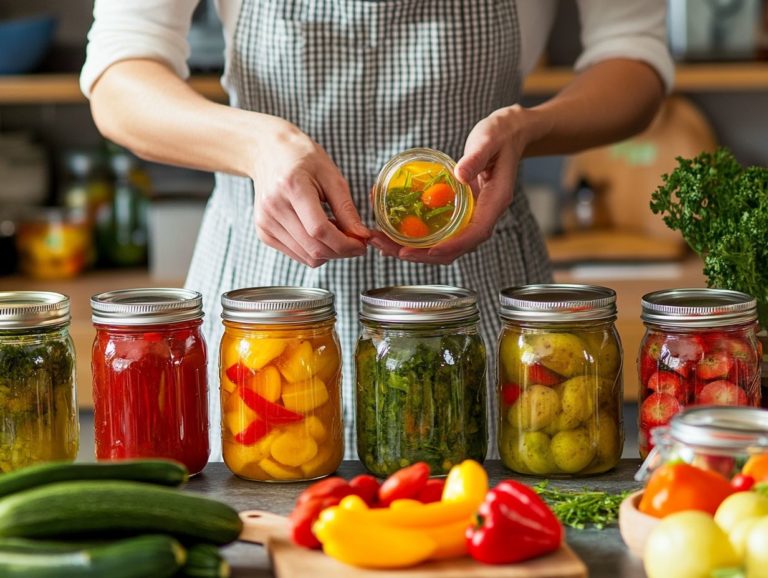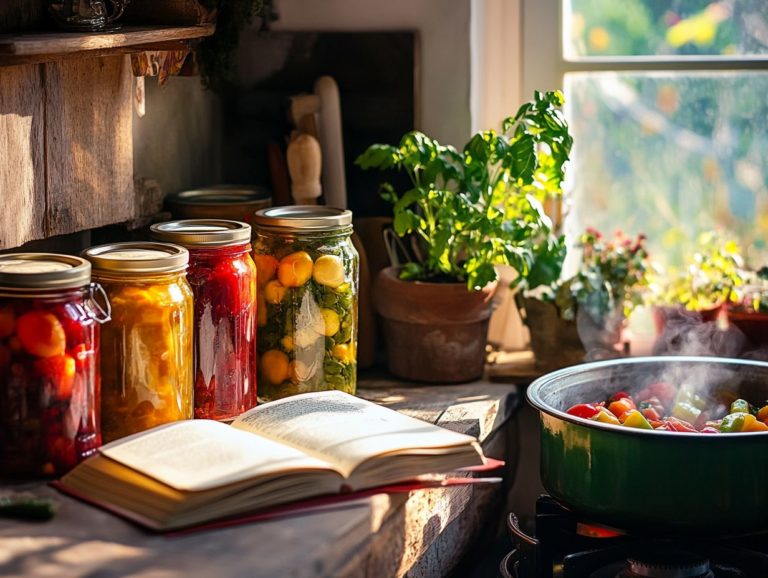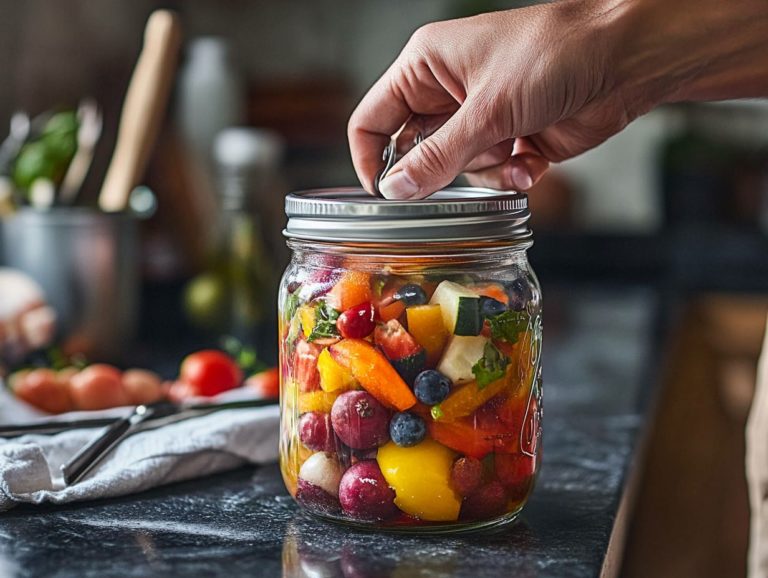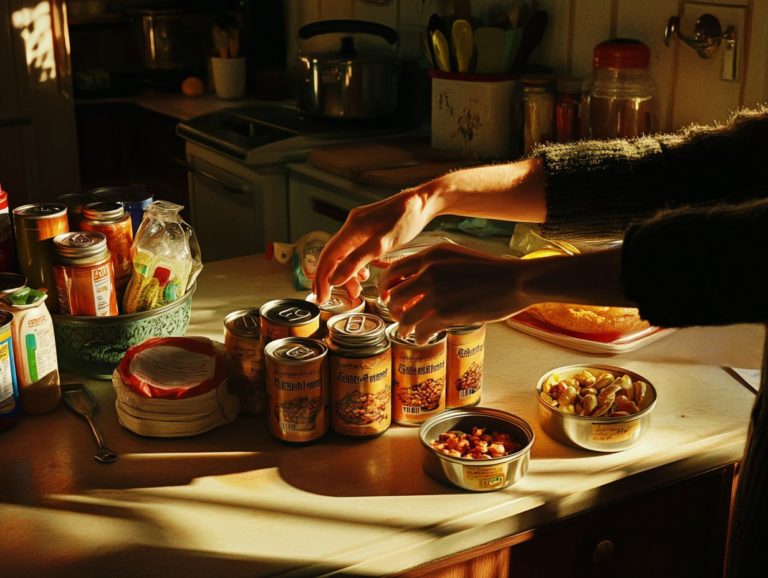How Long Can Canned Food Last?
Canned foods are a staple in your household, providing both convenience and an impressive shelf life. These preserved foods, such as canned fruit and canned vegetables, can be incredibly useful. But how long can you keep them? It s essential to grasp expiration dates, storage conditions, and the signs of spoilage for your health and safety.
This article delves into what those dates truly signify, the factors influencing shelf life, and how to recognize when a can has gone bad. You ll also uncover tips to extend the longevity of your canned goods and vital safety precautions related to food safety and preservation.
Let s explore how to keep your pantry safe and stocked with delicious food!
Contents
Key Takeaways:
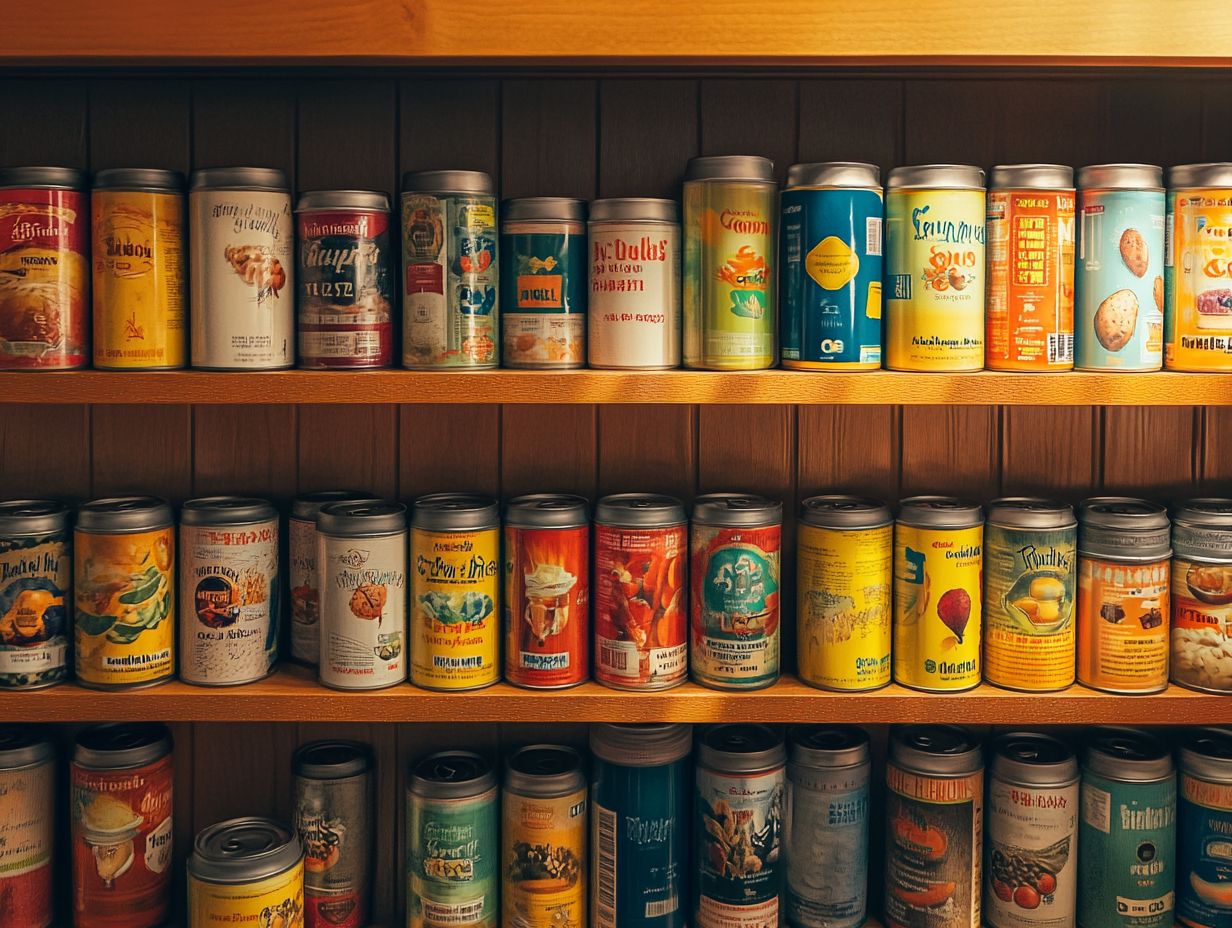
- Expiration dates on canned foods indicate quality, not safety. Use your judgment and inspect the can before consuming.
- Storage conditions and quality of ingredients can greatly affect the shelf life of canned foods. Optimal storage and quality ingredients may extend shelf life.
- Identifying signs of spoilage in canned foods is essential for preventing foodborne illnesses, especially a serious type known as botulism. When in doubt about a can’s safety, it’s best to throw it away.
Understanding Expiration Dates on Canned Foods
Understanding expiration dates on canned foods is crucial for ensuring both safety and quality. These dates indicate when the food is expected to maintain its peak quality, yet they are often misinterpreted by consumers.
While items like canned fruit and vegetables can often last well past these dates, recognizing their significance can help you mitigate the risk of spoilage and guarantee safe consumption.
Food experts from reputable institutions such as the USDA and Michigan State University underscore the importance of proper storage techniques. This allows you to savor the best flavors while steering clear of potential health hazards.
What Do the Dates Mean?
The dates printed on canned food carry important information about quality and safety, but they don t always reflect the actual safety of the products.
Understanding the nuances between terms like “best before” and “use by” can significantly enhance your decision-making process. The “best before” date refers to the period during which the product will offer its best taste and texture, indicating a gradual decline in quality rather than an immediate safety concern.
In contrast, the “use by” date is far more critical; it marks the last day when the product is guaranteed to be safe for consumption.
For canned goods, proper storage keeping them away from direct sunlight and excessive heat is essential in maintaining both safety and quality. By grasping these distinctions, you can make informed choices about what to keep and when to let go, ensuring a safer and more enjoyable eating experience.
Factors Affecting Shelf Life of Canned Foods
The shelf life of canned foods is determined by several factors, including storage conditions and the quality of ingredients used during the canning process. These elements come together to influence both the longevity and safety of your preserved foods.
Experts from organizations like Master Food Preservers emphasize that using proper food preservation techniques is key to keeping canned foods fresh longer.
It s important to understand that not all canned foods are created equal. For example, high-acid foods like tomatoes have different shelf life expectations compared to their low-acid counterparts, such as canned meat.
Storage Conditions and Quality of Ingredients
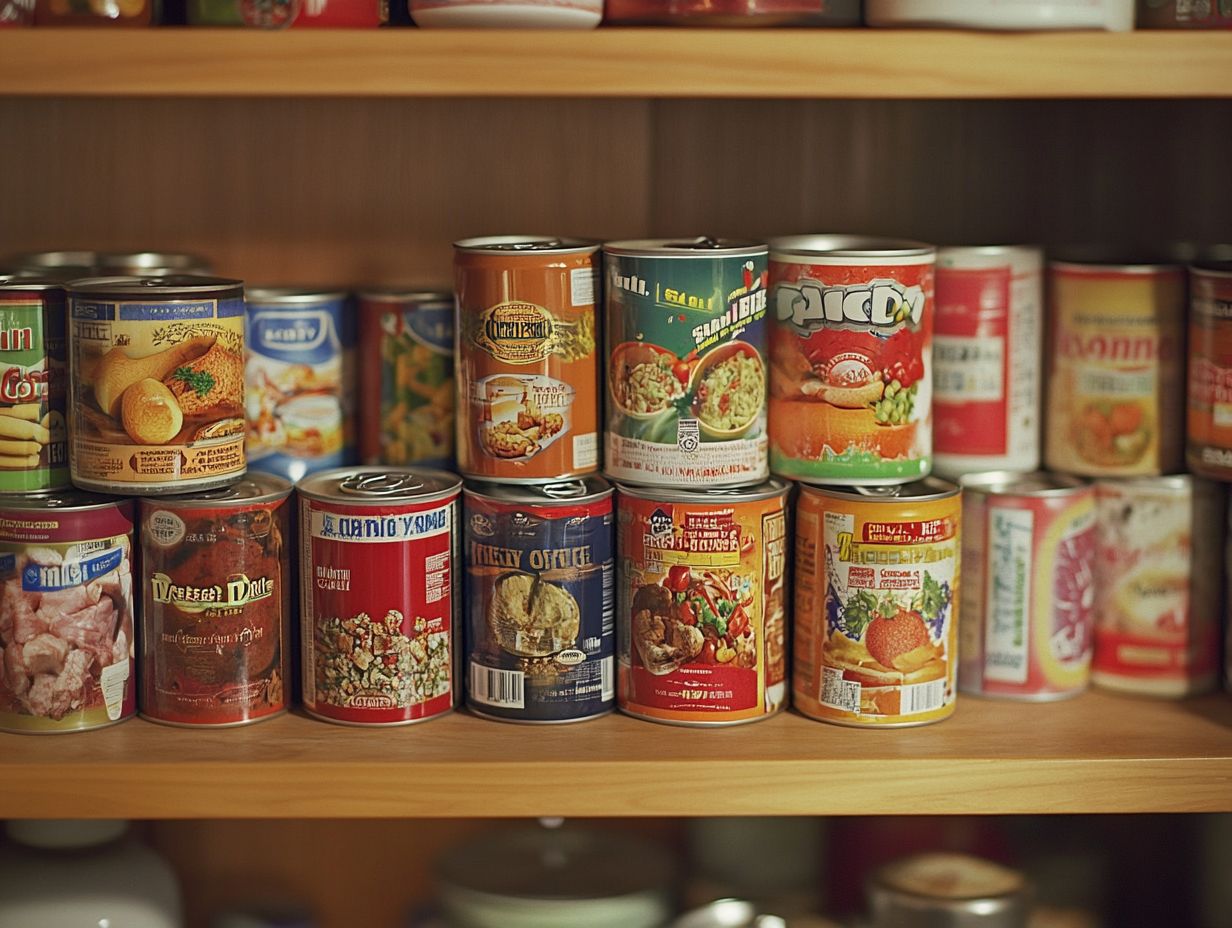
Your storage conditions greatly affect how long canned food lasts. Understanding how to tell if canned food is bad involves knowing that temperature and humidity are key factors in keeping your meals safe and tasty.
For best results, store your canned goods in a cool, dark, and dry place. Aim for a temperature between 50 F and 70 F to prevent spoilage and maintain their nutritional value.
High temperatures can change the food’s flavor and texture. Humidity can damage can seals, letting harmful things inside.
Be extra cautious with home-canned goods. Improper storage can increase the risk of botulism, a serious illness. Always follow strict guidelines for home canning. Use proper sterilization and add acid to reduce risks.
Signs of Spoiled Canned Foods
It’s crucial to recognize the signs of spoiled canned food. Certain indicators show whether food is still safe to eat.
Look out for bulging lids, strange odors, or leaks. These signs mean the can may be damaged.
Poor storage can spoil the taste or even lead to botulism, especially with home-canned items. Stay alert for these key signs to protect yourself.
Identifying Spoilage and When to Discard
Knowing how to spot spoilage in canned goods can keep you safe from health risks like botulism.
Watch for changes in texture unexpected softness or mushiness can signal spoilage. Changes in color, like dullness or fading, are also warning signs.
Check expiration dates and look for leaks or bulging. If you smell something off when opening a can, throw it away immediately.
Practice safe food handling, especially with low-acid foods. These can foster harmful bacteria growth.
Extending the Shelf Life of Canned Foods
You can make your canned foods last longer with effective storage and preservation practices.
Keep your canned goods in a cool, dry place, away from direct sunlight. Implementing a rotation system helps ensure you use older cans first.
Understanding the differences between high-acid and low-acid foods helps you tailor your storage methods. This knowledge maximizes the shelf life of your canned goods.
Tips for Proper Storage and Preservation
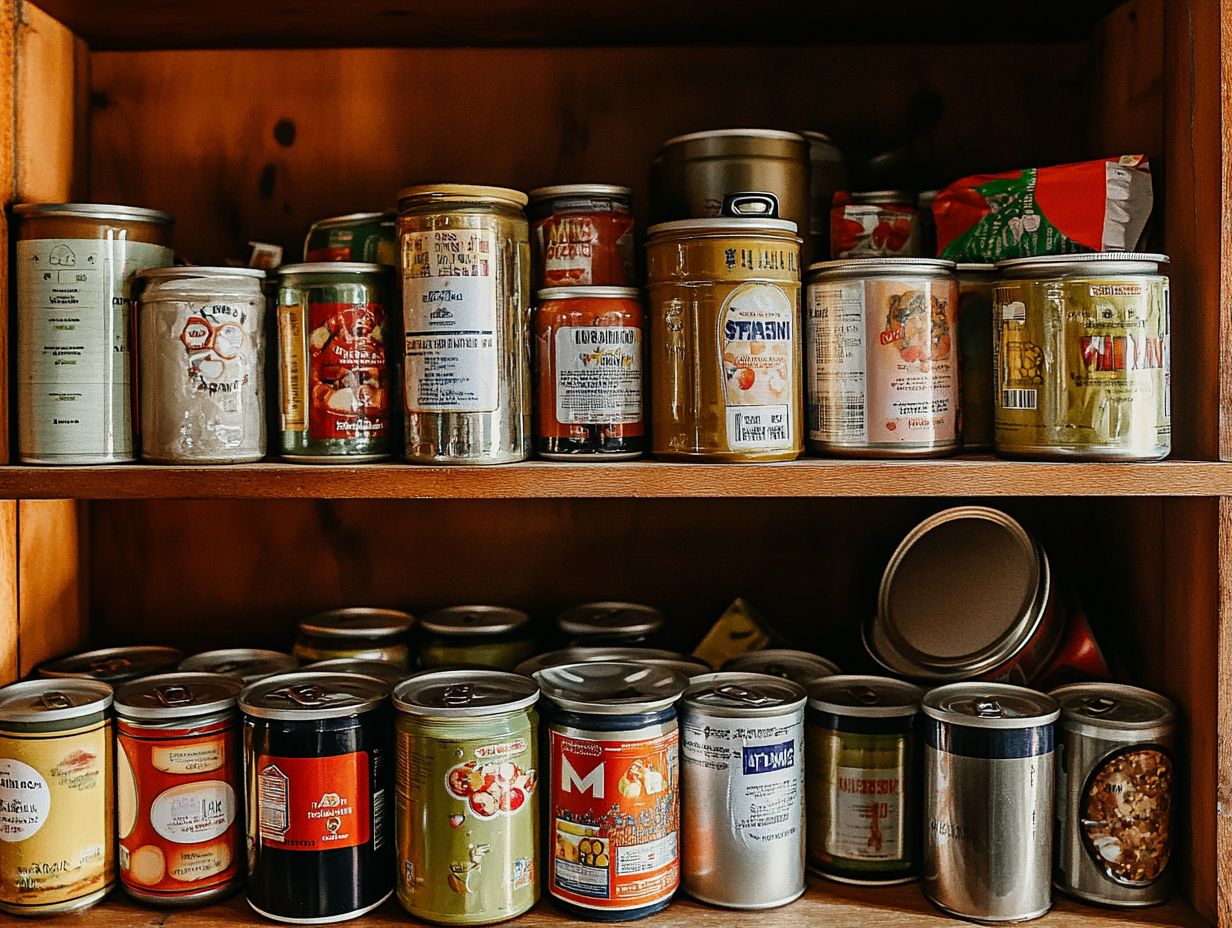
Storing and preserving your canned food properly keeps it safe and delicious.
Using the right containers is crucial. Glass jars are great for preventing harmful substances from leaching into your food.
Make sure to seal containers with airtight lids. This keeps moisture and air, which can spoil food, out. Store your canned goods in a cool, dark place to avoid temperature changes.
By following these tips, you enhance flavor and preserve nutrients, leading to safer meals and less waste.
Safety Concerns with Expired Canned Foods
Safety concerns regarding expired canned foods revolve around the potential risks tied to consuming items that have crossed their expiration dates. These foods may harbor bad bacteria, such as a type of bacteria that can cause serious illness, which can result in serious health complications.
Understanding the risks of eating expired canned foods is crucial for your safety. Food experts strongly recommend that you evaluate the integrity of the can and look for signs of spoilage before consuming expired products.
Potential Risks and Precautions to Take
With expired canned foods, potential risks extend beyond mere taste and nutritional quality. Significant safety concerns can impact your health.
As these products age, they may become hosts for harmful bacteria or toxins, leading to foodborne illnesses. This poses a serious threat, especially for vulnerable populations such as children, the elderly, and those with compromised immune systems.
To mitigate these risks, check for signs of spoilage before consumption look for bulging cans, leaks, or unusual odors. Store canned foods in a cool, dry place to help prolong their shelf life. Regularly reviewing your pantry inventory ensures that you consume the oldest items first, reducing the likelihood of using expired foods.
Frequently Asked Questions
How Long Can Canned Food Last?
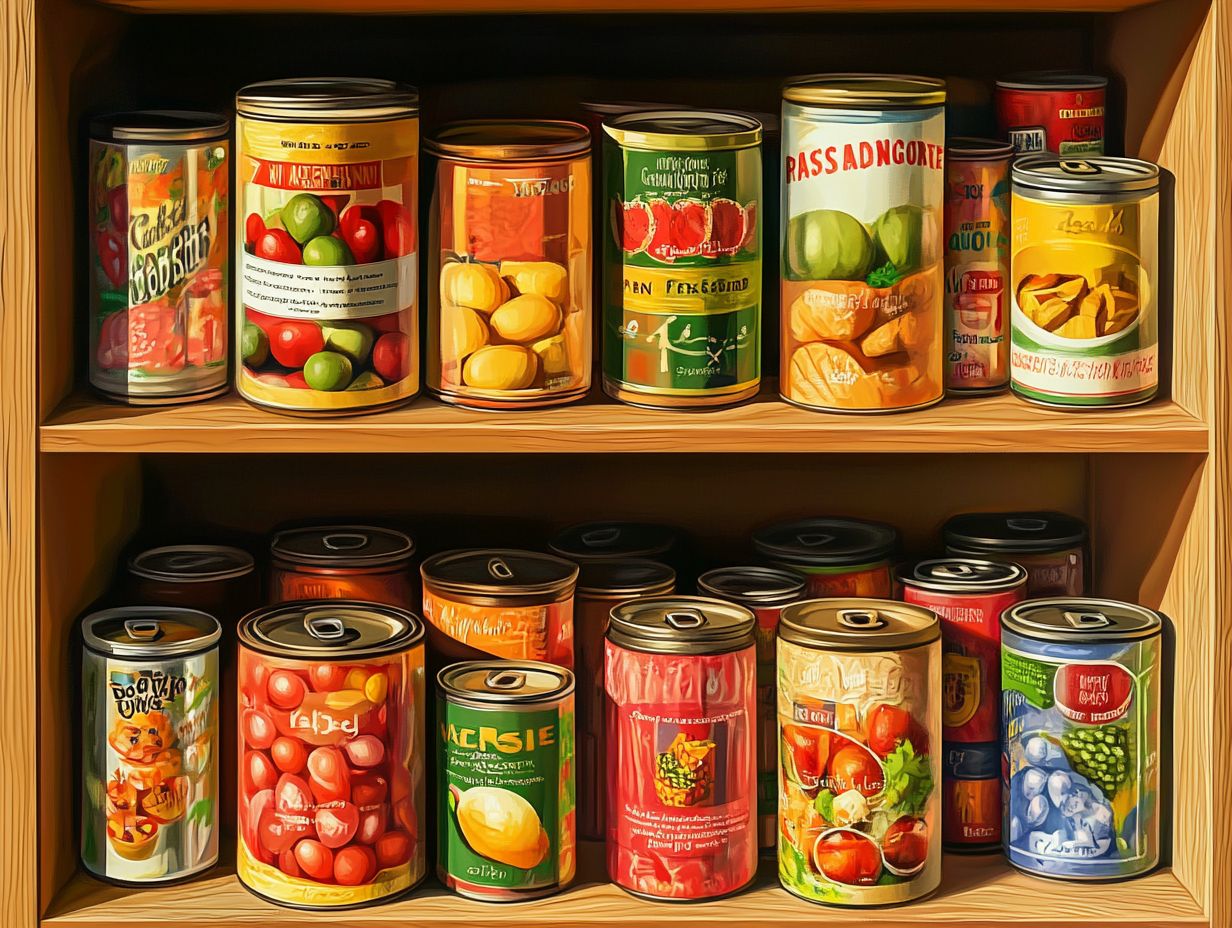
Canned food can last for an incredibly long time if stored properly. The shelf life of canned goods can vary depending on the type of food and storage conditions, but it usually lasts for 2-5 years.
What factors affect the shelf life of canned food?
The main things that affect how long canned food lasts are the type of food, how it’s stored, and how the can looks. For instance, how to make canned goods last longer is influenced by factors like acidity; acidic foods like tomatoes will not last as long as non-acidic foods like beans. High temperatures can decrease the shelf life of canned food, so it’s important to store them in a cool, dry place.
Can canned food ever go bad?
Yes, canned food can go bad. While the food inside may not spoil, the can itself can become damaged over time, leading to leaks or contamination. Always check for signs of damage or rust on the cans before diving into that can!
What happens if I eat expired canned food?
Consuming expired canned food can be risky, as it may not taste as good and could potentially cause food poisoning. Always check the expiration date and the condition of the can before consuming the food inside.
Is there a way to extend the shelf life of canned food?
One way to extend the shelf life of canned food is to rotate your stock and use the oldest cans first. This ensures that you are always consuming the freshest canned food in your pantry. Storing canned food in a cool, dry place can also help prolong its shelf life.
Can I freeze canned food to make it last longer?
While some canned foods can be frozen, it’s important to check the label or manufacturer’s instructions first. Freezing canned food can change its texture and taste, so it’s not recommended for all types of canned food. It’s best to consume canned food within its recommended shelf life.
Take a moment to check your pantry now! Ensure you’re eating safe and delicious canned foods.
